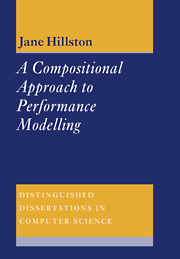Book contents
8 - Strong Equivalence
Published online by Cambridge University Press: 24 November 2009
Summary
Introduction
In this chapter an alternative notion of equivalence for PEPA components is developed. This equivalence, strong equivalence, is defined in Section 8.2. It is developed in the style of Larsen and Skou's probabilistic bisimulation which was discussed in Section 5.2.3. Here transition rates, already embedded in the PEPA labelled transition system as activity rates, are used instead of probabilities. As with strong bisimulation the relation aims to capture a notion of equivalent behaviour between components. However, observation now occurs without detailed knowledge of the individual transitions involved. Strong equivalence, unlike strong bisimulation, is unable to distinguish between a single (α, 2r) activity and two simultaneously enabled instances of the (α, r) activity.
Some properties of the relation from a process algebra perspective are examined in Section 8.3. Like strong bisimulation, strong equivalence is found to be a congruence relation for PEPA. In Section 8.4 we discuss some of the implications of strong equivalence for the system components being represented, and in Section 8.5 the implications for the underlying Markov processes are reviewed. Finally, in Section 8.6, we outline the use of strong equivalence as a state-to-state equivalence forming the basis of exact aggregation. An alternative approach to the generation of the Markov process underlying a PEPA model is also discussed. These ideas are illustrated in Section 8.6.3 with an example taken from Section 4.4.4.
- Type
- Chapter
- Information
- A Compositional Approach to Performance Modelling , pp. 113 - 136Publisher: Cambridge University PressPrint publication year: 1996



